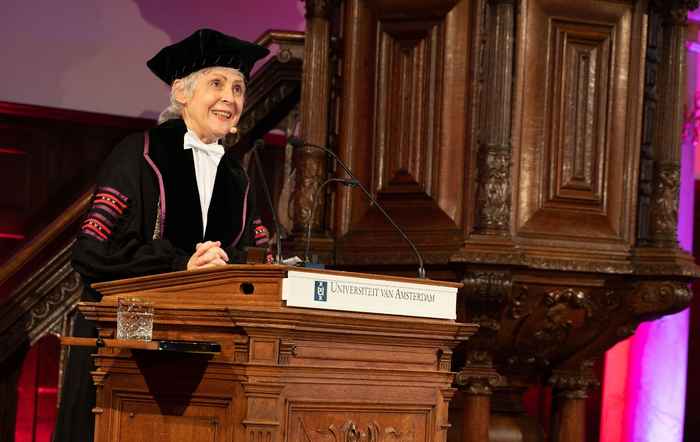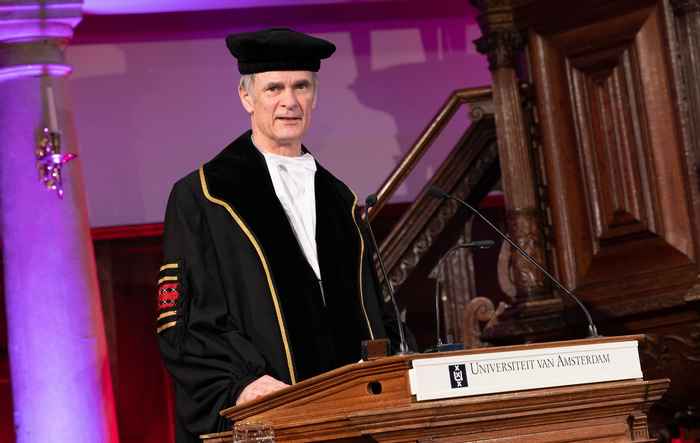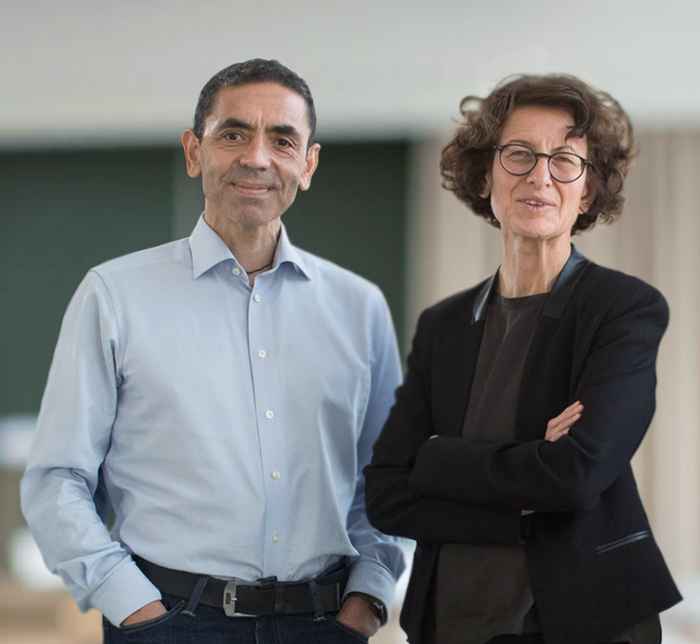UvA celebrates 390th birthday
12 January 2022
University professor of Environmental Economics Rick van der Ploeg then gave a speech in which he discussed the political and social obstacles and lobbies that stand in the way of a serious climate policy, and what could be done about it. Honorary doctorates were awarded to economist Okonjo-Iweala and to immunologists Ugur Sahin and Özlem Türeci. UvA alumnus and science journalist Anna Gimbrère presented this online Dies Natalis. Harpist Milena de Swart of the UvA Orchestra J.Pzn Sweelinck accompanied the entrance of the cortege with the piece Aljonushka by Mikhail Mchedelov.


Beyond the facts: On digitisation, mistrust and overcoming deep disagreements
In her speech, rector Karen Maex discussed what it would take for universities to remain at the heart of the 21st century discourse. According to Maex, a rapidly changing society with modern means of communication, bubble formation and conspiracy theories encourages a reduced trust in science. ‘Dissenters are also critical thinkers and we should try to find common ground there. After all, science isn't about validating outcomes; it's about sticking to the scientific method so that claims and opinions can be tested. While scientific results may be conclusive, they can also be tentative and raise new research questions,' Maex said. ‘It is worth pointing out that sound and legitimate science is divorced from politics. A government that doesn't overstep its bounds will apply scientific insights as a basis for policy decisions. Let's refuse to accept any blurring of the lines and take our own individual responsibility.’
After the speech, assistant professor of Political Communication Michael Hameleers and assistant professor of Political Science Eefje Steenvoorden discussed this topic with Karen.
Dies speech by Rick van der Ploeg
University professor of Environmental Economics Rick van der Ploeg delivered this year’s Dies speech in which he discussed the political and social obstacles and lobbies that stand in the way of a serious climate policy and what can be done about it.
‘The urgency of combatting global warming is undisputed. After decades of negotiations a bit of progress is being made here and there, but far too little to really make the difference. The current policy has previously led to unfair competition from countries that export CO2-intensive products because they do little or nothing about the climate and fossil fuel producers are now selling their reserves more quickly, with the associated negative effects for the climate', according to van der Ploeg. ‘Effective policies will require a substantial and rising price of emissions, a large-scale global incentive programme for the development of new green technology, transformative climate investments and associated financing, and the triggering of social, technological and political flywheel effects. Accompanying policies are also needed: a climate wall around Europe against unfair competition from countries that do nothing or much less about the climate and compensation for the lowest incomes because they are hit hardest by global warming and by the high costs of the green transition.’
Honorary doctorates
After the Dies speech, honorary doctorates were awarded to economist Okonjo-Iweala and to immunologists Ugur Sahin and Özlem Türeci.

Ngozi Okonjo-Iweala
This honorary doctorate is awarded to Dr Ngozi Okonjo-Iweala in recognition of her extraordinary contributions towards the fight for global equity, fair trade and environmentally sustainable development. Dr Ngozi Okonjo-Iweala is a Nigerian-American economist, fair trade advocate, environmental sustainability advocate, human welfare advocate, expert in sustainable finance and global development. She is the first woman and the first African to head the World Trade Organisation as its Director-General.

Ugur Sahin en Özlem Türeci
The University of Amsterdam (UvA) is awarding honorary doctorates to immunologists and married couple Ugur Sahin and Özlem Türeci for their outstanding and crucial contributions to research on the development of mRNA vaccines. Ugur Sahin is CEO of BioNTech SE and professor (W3) in Translational Oncology & Immunology at the Johannes Gutenberg University in Mainz, Germany. Özlem Türeci is currently president of the Association for Cancer Immunotherapy (CIMT) in Germany, Helmholtz Institute professor for Personalised Immunotherapy, and Chief Medical Officer at BioNTech SE.
Study associations pay tribute to honorary doctors
The honorary doctors were surprised with a tribute from the UvA’s study associations. Students of the SEFA study association asked questions to both honorary doctor Ngozi Okonjo-Iweala and honorary supervisor Sweder van Wijnbergen (professor of Economics) with Room for Discussion.
MFAS, the study association for Medicine, and the Faculty of Medicine’s student council jointly delivered a performance act in which Ugur Sahin en Özlem Türeci’s work was linked to a pandemic that gripped Amsterdam 350 years ago.